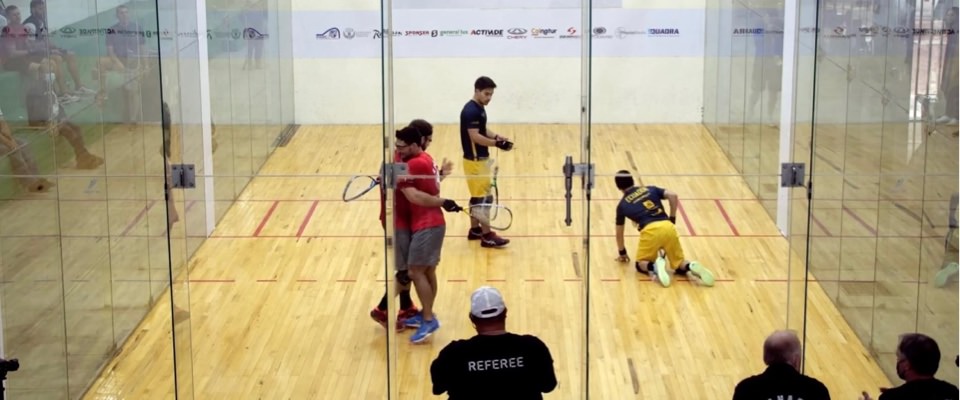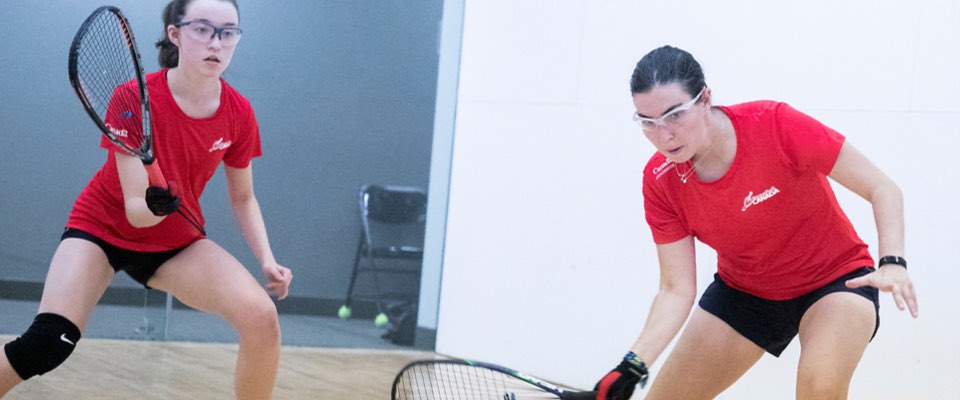Referees
Being a referee can be a very enriching experience that is accessible to all members of the Quebec Racquetball Association.

Being a referee : summary of all levels for the Officiating Certification Program
There are five levels in the Racquetball Canada officiating certification program. The first step is to be certified as Tech A. This will enable you to referee matches at a sanctioned tournament. A clinic held by a Level 2 or higher referee which covers basic rules and situational analysis will qualify you as Tech A. There is a written exam which must be successfully completed to pass Tech B.
The next step is Level 1. This requires completion of a written exam and also displaying a basic level of proficiency while officiating in a sanctioned tournament.
Level 2 is achieved by passing the Racquetball Canada level 2 written test which includes knowledge of rules, visual analysis and interpretation of rule application as it pertains to court situations. The emphasis is on game situations, as proper interpretation of the rules is critical. The individual must also achieve a passing grade by refereeing a minimum of two open-level doubles matches and two open-level singles matches. They are observed by two Level 3 referees who use an evaluation form to assess rule knowledge, procedures and rule application.
The final step is Level 3 Certification. The accredited Level 2 referee has a one year waiting period in which they practice their skills in sanctioned tournaments. They are then observed by two Level 3 referees, in two open-level doubles matches and two open-level singles matches. Upon passing they will be certified as Level 3 referees.
Certification as an international referee can be achieved by attending an international event and passing the written and observational criteria. All Racquetball Canada Level 3 referees are eligible to apply for the officiating positions at international events. Individuals who contribute in local and provincially sanctioned tournaments will be given primary consideration.
The Officiating Committee is under the Portfolio of the Vice President of Technical. As you can see, it can be a relatively arduous process to achieve the Level 3 Certification, as this can only be administered by the existing Level 3 referees. We need to create more Level 3 referees to open up the bottleneck inherent in this process. If we have more Level 3 referees, then we can develop greater numbers at all the levels below.
This can be achieved by working together to facilitate requests for evaluations, and through improved communication and knowledge of the process. The evaluation forms will be made available on this web site. Officiating can be a very rewarding experience that is available to all members of Racquetball Canada.
If you wish follow an Officiating certification program, please contact Robert Melançon at (450) 465-8742 or by email: tibob999@hotmail.com.
Resources
The Officials Code of Conduct – French only.
Coaches
Sport plays an important role in the lives of many Canadians.
Quality coaching is key to a positive sport experience for participants.
Coaches in Canadian sport
Sport plays an important role in the lives of many Canadians. Quality coaching is key to a positive sport experience for participants. Sport, government, and business leaders recommend that all coaches become trained and certified in the National Coaching Certification Program (NCCP) to ensure that the sport experience of every participant is a good one.
The NCCP is a collaborative program of the Government of Canada, the provincial/territorial governments, the national/provincial/territorial sport federations, and the Coaching Association of Canada.
A program in transition
The NCCP is currently undergoing a transition to a competency-based approach, in which a coach is trained and may achieve certification to coach a specific type of participant in a particular coaching environment.
What is the NCCP?
The NCCP is a training and certification program for coaches, offered across Canada in more than 60 sports. The program was designed to meet the needs of a wide range of coaches – from those who introduce youngsters to sport to those who work with Canada’s high performance athletes.
Since its inception, more than 875,000 coaches have taken part in NCCP activities that have helped them to develop the skills, knowledge, and attitudes required to coach effectively.
The NCCP prepares coaches to:
- better meet the needs of all participants in sport,
- provide a positive sport experience to participants,
- provide opportunities for participants to achieve their full potential in and through sport.
The current NCCP
The current NCCP is a knowledge- and course-based program with five levels of certification.
Coaching developing athletes
Levels 1 to 3 are designed for coaches of community, school, and club sport programs. Each level has three components: Theory, Technique, and Practice.
The course on theory includes topic areas such as planning, role of the coach, growth and development, safety, skill analysis, skill development, physical preparation, values and ethics, and mental training. Planning a practice is the focus in Level 1, planning a season in Level 2, and developing an annual plan in Level 3.
The technical component focuses on sport-specific techniques and tactics and information on rules of play, equipment, and skill development.
The practical component acknowledges the work done by the coach and, in some instances, provides opportunities for feedback on how the coach applies the concepts taught in the theoretical and technical components.
Coaching high performance athletes
Level 4 and 5 represents the top level of professional training for coaches and is designed for those working with high performance athletes and for those interested in a career in coaching. The program prepares coaches for leadership roles in national and international sport.
Level 3 certification and endorsement from your national sport federation (NSF) are required before you can enrol.
Level 4 and 5 consists of an applied study program of 20 Tasks: 12 Tasks for Level 4 and the remaining eight for Level 5. The following areas are dealt with: planning; athlete development including physical, psychological, technical, and tactical components; environmental factors; biomechanics; performance analysis; and leadership.
The new NCCP
The design of the new NCCP reflects the different types of coaches (“coaching streams”) in the Canadian sport system and the specific environments (“coaching contexts”) they work in. It will be up to each sport to determine which streams and contexts apply to its coach development system. The abilities deemed important to coach in a given context determine the scope of training required.
The new NCCP structure
| Coaching Streams | |||
| Coaching contexts | Community sport | Competition | Instruction |
| Initiation | Introduction | Beginner | |
| Ongoing participation | Development | Intermediary | |
| High performance | Advanced | ||
How coaches achieve certification?
In the current program, coaches achieve certification at Level 1, Level 2, or Level 3 by completing all three components (Theory, Technical, and Practical) and by completing the required number of tasks for Levels 4 and 5.
The new NCCP makes a distinction between coach training and coach certification. Coaches who need training will have opportunities to acquire or refine the skills, knowledge, and attitudes deemed important to coach effectively in a particular context. Coaches who want to be certified will be required to demonstrate their ability to achieve the requirements identified for their coaching context in areas such as program design, practice planning, performance analysis, program management, ethical coaching, support to participants during training, and support to participants in competition.
During the transition
Elements of the new NCCP will be in place by 2004, but a number of sports and provinces/territories are already offering workshops and other learning opportunities using the competency- and outcomes-based approach. During this period of transition, you could receive training and achieve certification in either the existing five-level program or in the new competency-based program, depending on the progress your sport and your province/territory have made toward converting to the new approach and structure.
More information: www.coach.ca

